One of the biggest challenges facing the world today is global hunger. The United Nations World Food Programme (WFP) backs this up by stating that “From Africa and Asia to Latin America and the Near East, there are 821 million people in the world who do not get enough food to lead a normal, active life.”

In fact, a 2019 report by the WFP confirms a rise in world hunger for the third year in a row. “There were 821 million chronically undernourished people in the world last year, up from 811 the previous year. 1 in 9 people in the world now faces hunger.
“Africa is the region with the greatest prevalence of hunger in the world – the figure changes to 1 in 5 people hungry in Africa. Hunger is also on the rise in Western Asia.”
The hunger situation is dire in Africa and these numbers keep rising daily. Regardless, this should not make us forget that hunger is a global problem and not exclusive to Africa.
This is perhaps why the United Nations World Food Programme tagged this year’s celebrations of #WorldFoodDay “Our Actions Are Our Future. Healthy Diets for A #ZeroHunger World”.
What are we doing to tackle global hunger? Well, in Africa, Jumia, the continent’s leading eCommerce platform is leveraging digital solutions to tackle hunger in the continent.
Jumia through its food marketplace, Jumia Food connects millions across the continent to healthy and delicious meals that are sold at affordable prices.
The food marketplace is present in 11 countries namely Ivory Coast, Algeria, Ghana, Kenya, Morocco, Tunisia, Nigeria, Rwanda, Senegal, Tanzania and Uganda. And in each of these countries, Jumia Food has become the go-to platform to order food.

You may appreciate this more when you look at where Africa was before the entry of Jumia and where the continent is today.
In the past, the idea of ordering food online was literally non-existent. However, with the digital revolution and the painstaking efforts of Jumia, it is now possible for everyone with a mobile phone and internet to order food on the internet.
Jumia Food riders are now a familiar sight in Kigali, Lagos, Kampala, Tunis and Nairobi among other cities; delivering the food requests of millions of customers at their doorsteps and offices. Of course, what is unique here is that the foods are well packaged and are healthy. This, in no small measures, can help contribute to the reduction of hunger in Africa.
It may interest you to know that the process for signing up restaurants on Jumia Food is thorough and exhaustive. Also, discounts on some of the foods have further made meals affordable to many Africans in general and Nigerians in particular.
As we celebrate World Food Day, the Managing Director of Jumia Food, Guy Futi says that all hands must be on deck to tackle global hunger adding that “Jumia Food is playing its part in combating hunger by connecting Nigerians to healthy and affordable foods which are delivered at the quickest possible time.”
Hunger is a global problem and every small action aimed at tackling it will go a long way. Jumia is taking action through its food marketplace to make healthy and sustainable diets affordable and accessible to everyone.



